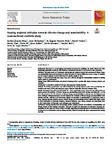Nursing students' attitudes towards climate change and sustainability: A cross-sectional multisite study
| dc.contributor.author | Álvarez-Nieto, C | |
| dc.contributor.author | Richardson, J | |
| dc.contributor.author | Navarro-Perán, MÁ | |
| dc.contributor.author | Tutticci, N | |
| dc.contributor.author | Huss, N | |
| dc.contributor.author | Elf, M | |
| dc.contributor.author | Anåker, A | |
| dc.contributor.author | Aronsson, Jennie | |
| dc.contributor.author | Baid, H | |
| dc.contributor.author | López-Medina, IM | |
| dc.date.accessioned | 2021-11-05T14:53:24Z | |
| dc.date.issued | 2022-01 | |
| dc.identifier.issn | 0260-6917 | |
| dc.identifier.issn | 1532-2793 | |
| dc.identifier.other | 105185 | |
| dc.identifier.uri | http://hdl.handle.net/10026.1/18248 | |
| dc.description.abstract |
BACKGROUND: Education is a social tipping intervention necessary for stabilising the earth's climate by 2050. Integrating sustainable healthcare into healthcare professions curricula is a key action to raise awareness. OBJECTIVES: This study aimed to: i) investigate nursing students' attitudes towards and awareness of climate change and sustainability issues and its inclusion in nurse education, ii) explore differences across a range of countries, and iii) compare attitudes in 2019 with those of a similar sample in 2014. DESIGN: A cross-sectional multicentre study. Data were collected through the Sustainability Attitudes in Nursing Survey (SANS_2) questionnaire. SETTINGS: Seven different universities and schools of nursing in five countries (UK, Spain, Germany, Sweden, and Australia). PARTICIPANTS: A convenience sample of first-year undergraduate nursing students. METHODS: The SANS_2 questionnaire was self-administered by nursing students at the seven participating universities at the start of their undergraduate degree, between September 2019 and February 2020. RESULTS: Participants from all seven universities (N = 846) consistently showed awareness and held positive attitudes towards the inclusion of climate change and sustainability issues in the nursing curriculum (M = 5.472; SD: 1.05; min-max 1-6). The relevance of climate change and sustainability to nursing were the highest scored items. Esslingen-Tübingen students scored the highest in the 'inclusion of climate change and sustainability in the nursing curricula'. Students at all universities applied the principles of sustainability to a significant extent at home. Nursing students' attitudes towards climate change and sustainability showed significantly higher values in 2019 (Universities of Plymouth, Brighton, Esslingen-Tübingen, Jaen, Murcia, Dalarna, and Queensland) than in 2014 (universities of Plymouth, Jaen, Esslingen, and Switzerland). CONCLUSIONS: Nursing students have increasingly positive attitudes towards the inclusion of sustainability and climate change in their nursing curriculum. They also recognise the importance of education regarding sustainability and the impact of climate change on health, supporting formal preparation for environmental literacy. It is time to act on this positive trend in nursing students' attitudes by integrating these competencies into nursing curricula. | |
| dc.format.extent | 105185-105185 | |
| dc.format.medium | Print-Electronic | |
| dc.language | en | |
| dc.language.iso | en | |
| dc.publisher | Elsevier BV | |
| dc.subject | Nursing | |
| dc.subject | Attitudes | |
| dc.subject | Sustainability | |
| dc.subject | Climate change | |
| dc.subject | University students | |
| dc.title | Nursing students' attitudes towards climate change and sustainability: A cross-sectional multisite study | |
| dc.type | journal-article | |
| dc.type | Journal Article | |
| dc.type | Multicenter Study | |
| plymouth.author-url | https://www.webofscience.com/api/gateway?GWVersion=2&SrcApp=PARTNER_APP&SrcAuth=LinksAMR&KeyUT=WOS:000724919500023&DestLinkType=FullRecord&DestApp=ALL_WOS&UsrCustomerID=11bb513d99f797142bcfeffcc58ea008 | |
| plymouth.volume | 108 | |
| plymouth.publication-status | Published | |
| plymouth.journal | Nurse Education Today | |
| dc.identifier.doi | 10.1016/j.nedt.2021.105185 | |
| plymouth.organisational-group | /Plymouth | |
| plymouth.organisational-group | /Plymouth/Faculty of Health | |
| plymouth.organisational-group | /Plymouth/Faculty of Health/School of Nursing and Midwifery | |
| plymouth.organisational-group | /Plymouth/Research Groups | |
| plymouth.organisational-group | /Plymouth/Research Groups/Institute of Health and Community | |
| plymouth.organisational-group | /Plymouth/Users by role | |
| plymouth.organisational-group | /Plymouth/Users by role/Academics | |
| dc.publisher.place | Scotland | |
| dcterms.dateAccepted | 2021-10-19 | |
| dc.rights.embargodate | 2021-11-9 | |
| dc.identifier.eissn | 1532-2793 | |
| dc.rights.embargoperiod | Not known | |
| rioxxterms.versionofrecord | 10.1016/j.nedt.2021.105185 | |
| rioxxterms.licenseref.uri | http://www.rioxx.net/licenses/all-rights-reserved | |
| rioxxterms.licenseref.startdate | 2022-01 | |
| rioxxterms.type | Journal Article/Review |


